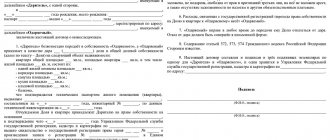Situations in which it may be necessary to re-register an apartment or part of it in the name of a relative, regardless of the circumstances and degree of relationship, occur quite often in Russia. There are also several options for this, but which of them are good depends on the circumstances in each individual case: there are advantages and disadvantages everywhere.
Moreover, if you decide to cheat and fake a sale, you should remember that you will have to pay tax, which is also not suitable, given that the tax amount is calculated based on the value of the real estate. We should not forget that the transfer of proprietary rights may be refused. The most common reasons are the submission of not all required documents, their incorrect execution, falsification of information, contract terms that contradict the law, and detection of an attempt at a fictitious transaction.
Registration of an apartment for relatives
Despite the fact that the most common method of transferring property rights is a real estate purchase and sale transaction, this is not always formalized between relatives for a number of objective reasons.
Moreover, when selling living space to a spouse, child, parent or other person of blood relationship, the law does not provide any advantages. As a rule, this is far from the best way in this case. As you know, property acquired during an official marriage is jointly acquired, which means it will be subject to division during a divorce. Accordingly, the current owner may not be at all interested in this situation, wanting his property to remain with his relative and nothing more.
Dear readers!
Our articles talk about typical ways to resolve legal issues, but each case is unique. If you want to find out how to solve your specific problem, please contact the online consultant form on the right →
It's fast and free!
Or call us by phone (24/7):
If you want to find out how to solve your particular problem, call us by phone. It's fast and free!
+7 Moscow,
Moscow region
+7 Saint Petersburg,
Leningrad region
+7 Regions
(free call for all regions of Russia)
For children
You, as the owner of the apartment, have the right to re-register it in the name of any person in the way you choose yourself. There are no strict criteria such as prohibiting the sale of housing to children or mandatory donation to parents. If we take into account the human factor, everyone still considers different options for different relatives.
For children, either a deed of gift or a will is often drawn up. Thus, the parent has the opportunity to protect their property rights as much as possible. In addition, the donated property cannot be divided during a divorce under any pretext, which means it will remain 100% with the recipient. Of course, if this person does not decide to sell the apartment, but this will already be under his responsibility.
How to transfer ownership of housing to a minor child?
The transfer of property to young children is absolutely identical to any other transaction concluded with an adult. The only difference is that the interests of the child are represented by his parent or guardian, who in any case does not receive ownership rights to the property accepted for the minor.
For spouse
In the case of spouses, there are many more options and it all depends on the relationship in the family. For example, if the relationship is not ideal, it makes sense to enter into a purchase-sale or exchange agreement. If the relationship is good, you need to preserve the property from outside encroachment, then a gift agreement is better. However, you will not be able to claim the apartment after that or even part of it. As an option, you can draw up an agreement regarding the division of property acquired jointly if we are talking about a marital divorce.
For parents
Parents should renew their housing, again, in the form of a gift, in order to secure it for them and save them from having to pay taxes. This is the most optimal option, but not the only correct one, since it all depends on your goals and family relationships.
For grandchildren
If it is necessary to register real estate for a minor child or minor grandchild, only a deed of gift is appropriate. The parent (adoptive parent, guardian) accepts the gift on his behalf. For older, adult grandchildren, a will is more appropriate.
For brother/sister
Donation or purchase and sale are good when re-registering an apartment in the name of a sister or brother, just like a deed of gift, if everyone is happy with this option. Each owner has the legal right to dispose of his property as he needs it, so no one will interfere with the method you choose.
To distant relatives
Considering how best to re-register an apartment, we note that in addition to the option of selling and deed of gift, today there are slightly less popular, but still very relevant methods of alienating housing:
- Notarized pledge agreement;
- Apartment rent.
In the first case, it is noteworthy that in Russia the state lending system is not ideally developed and it is possible to obtain a loan only by documenting the presence of a sufficiently high level of income. The rent option is convenient because you don’t need to pay money for the apartment. Rent can be called a gratuitous transfer of an apartment, but under certain conditions, which makes the gratuitousness conditional.
Nuances of family ties
Family ties and the chosen method of transferring property are not as important as the nuances of taxation. Depending on the distance of relationship, tax obligations change. The closer the relative, the higher the likelihood that he is exempt from taxes and vice versa.
How to choose housing
First of all, decide on the residential complex where you plan to buy an apartment. Study the real estate market - offers from developers and individuals. Choose housing that is suitable in terms of square footage, number of floors and other parameters that are important to you.
After this, make sure the construction company has a good reputation:
- Find out if the developer plans to go bankrupt - this information is contained in the Unified Register of Bankruptcy Information. If you find such information, it is better to refuse the transaction.
- Check for the presence of court cases against the company - this can be done in the online file of the website of the Federal Arbitration Courts. Study why equity holders and contractors sue the developer. Perhaps the reason is the low quality of work or failure to fulfill obligations under the DDU.
- Look at the project documentation - it should be posted on the company’s website. You need to find out when the house is planned to be delivered and compare its actual condition with the developer’s plans.
- Read reviews about the residential complex and construction company on forums and social networks.
If the right of claim is exercised by a legal entity, its reputation must be studied in a similar way. Find out how long ago the organization was founded and what it does. You can also search the Internet for information about a private seller.
There are offers to sell based on the assignment of the right of claim under a preliminary DDU, what does this mean? Such wording indicates that the shared construction agreement has not been registered with Rosreestr. It’s not worth agreeing to the deal, no matter how attractive the price may seem. The fact is that this document only confirms the seller’s intention to issue a DDU in the future, but the developer has no obligation to transfer ownership of the property. As a rule, such schemes are used by scammers.
Apartment renovation options
As practice shows, in any case, it is better to re-register an apartment in the name of a relative only officially, with the conclusion of an appropriate agreement, since we are talking, one way or another, about a transaction. It could be:
- Purchase and sale;
- Gift deed for an apartment;
- Transferable annuity;
- Exchange of property;
- Housing will;
- Inheritance.
At the same time, tax deductions cannot be ignored, which are different in each case and depend on factors such as:
- Relation degree;
- Market value of a residential apartment in a given region;
- Presence or absence of tax benefits.
Donation
Transferring an apartment directly under a gift agreement is in every sense a gratuitous transaction. It excludes the receipt of money from the donee and prohibits setting any conditions for him to obtain housing rights, as can be done in the case of a will. Accordingly, the donor does not receive anything in return and, if the gift is accepted, he is immediately deprived of his property rights during his lifetime. At the same time, it is prohibited to draw up a deed of gift on behalf of a minor, even if parents or guardians act instead. On the one hand, a gift agreement is the best option, because the gift will not be considered jointly acquired property, remaining in the personal property of the recipient even in the event of a divorce. On the other hand, it is possible to challenge the donation in court if any of the interested parties has grounds for this.
Will
The question of how to re-register an apartment in the name of a relative after the death of the owner, according to a will, is perhaps the simplest. When a person wants his property to go to a specific person, and not be legally divided among everyone, he goes to a notary’s office and draws up a will there. In this case, it does not matter at all which relative we are talking about. For example, despite the fact that the owner may have children who are heirs of the first priority, if the parent left a will in the name of his second cousin, the apartment will go to the second cousin and no one else has the right to claim it, with the exception of disabled young children, who a small share is equally assumed.
Rent agreement
As for the rent agreement between relatives, in this case one party, the owner, transfers his apartment to the other, while the other accepts it, pledging to pay the first a fixed amount of money in an agreed manner. The form of payment can be different, for example lifelong or unlimited. Rent is paid to the owner until the end of his life, after which ownership can be re-registered.
Exchange agreement
Unlike deed of gift and annuity, the exchange agreement has more expressive features. The transaction assumes that the parties exchange apartments or exchange an apartment for a private residential building. In a voluntary exchange with relatives, it is not necessary to exchange real estate objects of equal size. However, so that there are no grounds to challenge the deal in court, it is important to record all the nuances and notarize the agreement, indicating that the party receiving the smaller area has no complaints and understands what it is doing.
Agreement on division of property between spouses
As for a voluntary agreement, divorcing spouses can divide property as they wish if they find a compromise. However, even when everything is divided peacefully, it makes sense to have the agreement certified by a notary office, so that later, having changed their mind, one of the parties does not decide to take everything away through the court. All conditions must be written down completely and clearly, excluding possible claims in the future: this gives certain guarantees to both parties.
Re-registration of an apartment after the death of the owner
The current owner of the living space may not care at all about transferring his property to relatives - the transfer of property rights also occurs during inheritance by law. The apartment goes to the first-priority heirs, who contact a notary to apply for inheritance rights within six months from the date of death of the testator. Having entered into rights, having received a certificate of inheritance, Rosreestr makes all the necessary changes regarding the new owner with it and other documents within three days.
Re-registration of a share in an apartment
When the apartment is in shared ownership, where the shares are clearly allocated and each owner has a separate right to his part of the living space, each of them has the opportunity to alienate his part in favor of another person. Without the consent of other owners, only a share of the apartment can be rewritten, and all of it - only with the written and notarized consent of all together. This transaction is formalized at a notary's office. The choice of contract, that is, the method of alienation, is the same as in other cases - be it a sale, a gift or something else.
It is worth noting that in the case of a sale, the risks of challenge are significantly reduced, while in the case of a donation they are quite high. In addition, contestation, as a rule, occurs after the death of the donor, unless the donor himself decided to challenge the deed of gift. In addition, no matter what family ties and relationships, giving real estate, even in shares, is a very expensive pleasure.
Re-registration of the share as such is impossible if the apartment is one-room, since it is not possible to allocate a separate part of it in kind.
Re-registration of rights to a room in a communal apartment
In the same way, you can re-register ownership rights to any of your relatives by transferring to him your room in a communal apartment. However, for this it is important to have rights to it; the share must be allocated. If this is municipal housing, such a transfer is also possible, but necessarily with the consent of the municipality, since the contract is concluded with it.
Inheritance
Transfer of property rights by inheritance, both by law and by will, is possible only after the death of the testator and acceptance of the inheritance by the heir/heirs on the basis of a certificate of the right to inheritance issued by a notary. Income received through inheritance is not subject to personal income tax.
At the same time, do not forget that together with the property, incl. apartment, the debts of the testator also pass to the heirs, for which the heirs are liable within the limits of the inheritance mass. Read our article about the difference between a deed of gift and a will for an apartment.
What are the most profitable and convenient ways to re-register?
When choosing a method of profitable and convenient re-registration, pay attention to the consequences of your actions, as well as whether you want your relative to pay taxes, and whether you want to pay them yourself. In addition, consider the risks not only for yourself, but also for the relative to whom the rights are transferred. If you are afraid that he may be deceived and his home taken away, choose a deed of gift. When you are afraid that you will be deceived, make a sale.
The most profitable option, if you do not plan to make a profit with a relative, is still a gift agreement; otherwise, an equally convenient and profitable option is purchase and sale. With rent, exchange and inheritance, there are much more complexities and time and effort are also much higher.
In what cases do you need to pay taxes?
Spouses, parents, children (including adopted children), grandparents and brothers, sisters are exempt from taxation if they have at least one common parent with the current owner.
For distant relatives, a tax of 13% is provided, calculated from the cadastral value of the apartment. If we are talking about selling, you, as a person who has made a profit, pay this 13% yourself, but only if you have owned the apartment for less than three or five years (depending on when it became yours). In some cases, for example, when donating an apartment or drawing up a will, the agreement is subject to mandatory notarization. In other cases, you can do without this, but at your own peril and risk. When the living space is in shared ownership, you can draw up an agreement, which is also registered by a notary. The transfer of ownership rights itself is always registered in Rosreestr after submitting the appropriate application with the attached documents on the basis of which the rights are transferred.
Possible risks
What troubles may new investors face:
- Right of claim with unfulfilled obligations. For example, late payments, in connection with which the developer has already incurred penalties. To avoid such problems, you need to visit the office of the construction company and find out about all the details of the planned transaction before you sign the assignment agreement.
- If permission is not received from the developer to transfer the right of claim, he can cancel the contract through the court. In this case, in order to return the money, the already failed shareholder will have to sue. It is better to play it safe and obtain written consent from the construction company, even if the DDU does not require this.
- If the assignor used maternity capital funds to pay for the DDU, he is obliged to allocate shares to the children in the constructed apartment. In this case, you will need legal advice - infringement of the interests of minors may result in the cancellation of the assignment agreement.
- If the seller purchased future housing with a mortgage, he must obtain the bank's permission for the transaction. Until the apartment is built, property rights to it may be pledged - after registering the property, a mortgage is issued. If there is no consent of the creditor, he can go to court, and the transaction will be declared invalid.
- Fraud is possible - for example, duplicate sales of the same apartment. This can happen if the agreement is not registered with Rosreestr. If you prepare the documents in the proper order, such problems will not arise.
- Upon termination of the contract, the developer is obliged to compensate only the amount specified in the DDU. Even if the new shareholder acquired the right to claim at a higher value. Sometimes, during the mass sale of apartments to organizations, this figure is deliberately underestimated.
Professional support of the transaction for the assignment of the right of claim significantly reduces risks. AN Transfer specialists will help you choose a reliable developer and a suitable apartment. They will tell you what dangers exist and how to avoid them, and draw up an assignment agreement in accordance with current legislation.
Preparation of a package of documents
When completing all transactions involving the alienation of real estate, including for relatives, the current owner will have to prepare a whole package of documents. You can see more details about what it should include later in the article, but first of all, you should highlight the main papers that are important to take care of in advance:
- Original passports of all parties to the transaction (the current owner of the apartment and the relative in whose name it will be alienated);
- Documents confirming ownership of the apartment, including a recent extract from the Unified State Register of Real Estate (USRN), which must be taken a few days before signing the contract;
- Papers on the basis of which the right of ownership arose (certificate of inheritance, deed of gift, purchase and sale agreement, privatization, etc.);
- If the property is co-owned or jointly acquired, it is necessary to obtain a notarized written consent to the alienation of the property of each co-owner;
- An extract from the house register about the citizens registered in the apartment: at the time of alienation, it is desirable that everyone be written out from there, so this issue should also be resolved in advance.
How to transfer an apartment to another person
In order to transfer an apartment to another person, you can use one of the options: conclude a purchase and sale agreement, donation, or will.
Important! There is a very important advantage in re-registering the right to real estate through a purchase and sale transaction. If all documents are completed correctly, it is impossible to challenge this transaction.
Perhaps for some parties this advantage may turn out to be a disadvantage, since it will no longer be possible to return the apartment after its complete alienation. Such an agreement cannot be challenged, that is, the former owner will no longer be able to return it to himself.
When donating real estate, the positive thing is that the donated property remains the property of its owner even in the event of a divorce from the spouse. A distinctive feature of donation is that the one who donates this apartment has the right to return it in court. One of the disadvantages of any re-registration method is the cost. Donating an apartment to a distant relative or a third party is accompanied by the payment of a large sum of money as tax. An exception is the gift of an apartment to close relatives; in this case, no tax is charged.
Registration of transfer of ownership
When re-registration of an apartment is necessary in favor of a minor child under the age of eighteen, his official guardian, parent or adoptive parent must act in the interests of the latter. If we consider the deed of gift, it does not come into force until the donee officially accepts the gift, and this requires registration by a notary, which a minor cannot do on his own. Only after acceptance can we talk about re-registration of proprietary rights, and this procedure should be carried out by the same person.
Contacting Rosreestr is mandatory: until changes are made to the Unified State Register, the apartment will legally belong to the current owner and, in which case, will be inherited in the general manner.
The re-registration process sequentially includes:
- Choosing the appropriate option;
- Preparation and collection of necessary documents;
- Consultation with a lawyer or notary;
- Drawing up and concluding an agreement;
- Re-registration of property rights through Rosreestr.
It should be noted that a correctly executed and well-drafted contract practically eliminates the risk of challenging it in court. Therefore, legal advice and assistance are of particular value. Moreover, in case of disputes, the notary certifying the transaction undertakes to be present in the courtroom as a witness, which is also a big plus. Since the cost of real estate is quite high, the possibility of conflicts cannot be ruled out despite family relationships.
Advantages and disadvantages
Advantages of transferring the right of claim to an apartment:
- For the seller: if there are few similar offers on the real estate market, you can make money. Usually apartments in good areas are sold out at the start of sales. While the house is being built, the price for them can increase by 30-50% or even more. Remember that the difference in value is considered income on which you must pay tax.
- For the buyer: the opportunity to purchase an apartment in the residential complex of interest, even if all apartments from the developer have already been sold.
The main disadvantage of assigning the right of claim is that there is no guarantee that the house will be handed over. If, by purchasing a ready-made property, the buyer immediately becomes the owner, then under the assignment agreement you may not receive housing at all.
The legislation has maximally protected shareholders: now their funds are stored in escrow accounts and cannot be received by the developer until construction is completed. Despite this, the risk of being left without an apartment remains - for example, in the event of a company bankruptcy or delay in delivery deadlines. The person will lose time, and part of the money will be eaten up by inflation.
Other disadvantages of the assignment:
- The transaction takes longer, especially if there is a home loan or minor shareholders. It is concluded between three parties: the seller, the buyer and the developer. Before submitting documents to Rosreestr, you need to discuss the conditions with all participants. Some construction companies allow the sale of property rights to an apartment without prior approval - in this case, notification of a change in shareholder is enough for them.
- Some developers charge the assignor a fee for re-registration of the right of claim. It can be quite high - for example, 10% or 15% of the cost of the apartment. This condition is contained in the text of the DDU.
In addition, there are a number of legal risks that need to be taken into account when concluding an assignment agreement - we talk about them in the last section. It is best to entrust transaction support to a professional realtor or lawyer. He will tell you what to watch out for and how to avoid possible troubles.
Free real estate consultation
More details
200-60-91
Re-registration of property may be refused
Re-registration of real estate may be refused if it is encumbered, in particular under the security of a bank and the latter did not give permission for re-registration.
Seizure also does not give the right to transfer ownership rights. In addition, a refusal may be issued upon submission of an application if not all documents were submitted. Therefore, make sure that everything is collected in advance and decorated correctly. To re-register your apartment to a relative as quickly as possible, it is necessary that all required documents are in order and collected in a timely manner.
Standard documents:
- Personal passports of the parties to the transaction, as well as birth certificates for minors, if they are involved.
- Establishing title and confirming ownership.
- Extract from the Unified State Register of Real Estate (USRN).
- Notarized consents, if there are co-owners.
- Cadastral passport and real estate plan.
- Technical plan (can be issued at the Technical Inventory Bureau).
- Extract from the house register.
Since, as a rule, we are not talking about a sale, additional papers, such as information about the absence of encumbrances or an extract from the personal account, are not required.
Purchase procedure
The current equity holder must provide the buyer with:
- original DDU;
- passports of all shareholders (or birth certificates if they are minors);
- the spouse’s consent to the transaction, certified by a notary (if the agreement was concluded during marriage);
- permission from the guardianship authorities (if the shareholder is a child or an incapacitated citizen);
- the developer’s consent to draw up an assignment agreement;
- certificate of payment amount (from the construction company);
- permission from the bank if mortgage funds were used when concluding the DDU.
How the transaction for the assignment of the right of claim is carried out:
- Choose a suitable apartment. Review publicly available information about the seller and developer. If you don’t have enough money to buy, you can take out a mortgage. But such loans are not issued everywhere - first of all, find out which banks the developer cooperates with.
- Order a legal assessment of the transaction. It is necessary to check its legality, the completeness of the package of documents, and assess possible risks. If necessary, make sure that the consent of the developer and the bank is obtained.
- Sign the assignment agreement. It is usually drawn up in three copies: for the seller, the buyer and Rosreestr. The developer and the bank that issued the mortgage may also request this document or a copy of it.
- Transfer the agreed price of the apartment to the assignor - by transfer to an account or in cash. Be sure to keep the supporting document (payment order, receipt).
- Pay a state fee of 350 rubles - this must be paid by the buyer.
- Submit the contract for state registration. If the apartment is not paid in full, a representative of the construction company must be present at the transaction, since the debt passes to the new shareholder.
- Receive a document with Rosreestr marks. As a rule, it takes about 10 days to register an assignment agreement.
Please note that along with the right of claim, all obligations to the developer under the DDU are transferred to the new shareholder. It will no longer be possible to make changes to the contract; you will have to agree to the conditions specified in it.
After registering the assignment agreement with Rosreestr, the assignee should wait until the house is handed over. Then register ownership of the apartment. To do this, you will need a passport, DDU and a document on the transfer of the right of claim, a copy of the permit to put the building into operation, a receipt for payment of the state fee in the amount of 2,000 rubles. To confirm your registration, you will be given a USRN extract.
If you took out a mortgage to buy an apartment, you need to provide a loan agreement to Rosreestr. Then take the received extract from the real estate register to the bank so that it can issue a pledge (when this is provided for by the terms of the loan).
The cost of re-registration, what will be the costs?
When considering the costs that re-registration of rights to residential real estate entails, everything is individual. For example, the cost of a notary's services will depend on what services he provided to you (drawing up an agreement, consulting, collecting documents for you, handling registration, and so on). The same deed of gift is estimated at 0.5% of the apartment’s valuation, but within the range of 300 to 20 thousand rubles. Examination of documents costs from three to five thousand, and registration of new rights in Rosreestr requires payment of a state fee of about a thousand rubles, depending on the region.
Minimizing costs
When it comes to minimizing costs, it all depends on what exactly you want and your individual situation. For example, if you want to reduce costs for your relatives, this can be easily done using the same deed of gift, but for you there are no costs as such, other than the loss of real estate. The only significant expense item is payment for legal and notary services. However, the situation here is ambiguous.
On the one hand, you can prepare all the documents yourself, accompanying each stage personally, spending money actually only on notarization of important contracts. On the other hand, by refusing the same counseling, you can do everything wrong, having negative consequences in the near future. Therefore, before making a final decision, weigh everything twice and determine whether you can independently cope with all the tasks as it should be.
Who is better to contact: a lawyer or a notary?
It is also worth noting that when concluding a transaction to re-register an apartment in the name of any relative, it is in your interests to comply with all the points that reduce the risk of ending up in the courtroom.
Do not neglect the services of legal professionals, citing the successful practice of friends or any rumors. By wanting to save money, you can create a lot of serious problems for yourself. However, you should not blindly trust a lawyer or notary; control the situation, check every paper, carefully read the documents and check all the details. To avoid having to spend money twice, it is better to immediately entrust the process to one specialist – a notary. He has a legal education and can accompany any real estate transaction, from consulting to registering property rights for the new owner.
Non-notarized transaction execution
Separately, it is necessary to highlight such a concept as non-notary registration of transactions involving the transfer of an apartment to a relative. This method is interesting when you need to save time and money, and also when the owner is thinking about the possibility of canceling the contract in the future. However, this is very risky, since the role of the notary is quite large, because he:
- Helps to check the correctness of documents and their complete composition;
- Bears responsibility before the law for the transaction you enter into;
- Helps to draw up a contract correctly.
https://www.youtube.com/watch?v=aGpLYP-5npI
Refusal of legal services allows you to minimize the costs of the transaction (any re-registration of real estate to another owner is a transaction, even if it is a gift). Similarly, close blood relationships and the choice of contract option reduce costs. If it is gratuitous, it exempts you from taxes completely or almost completely; if it is paid, the amounts increase if necessary.









